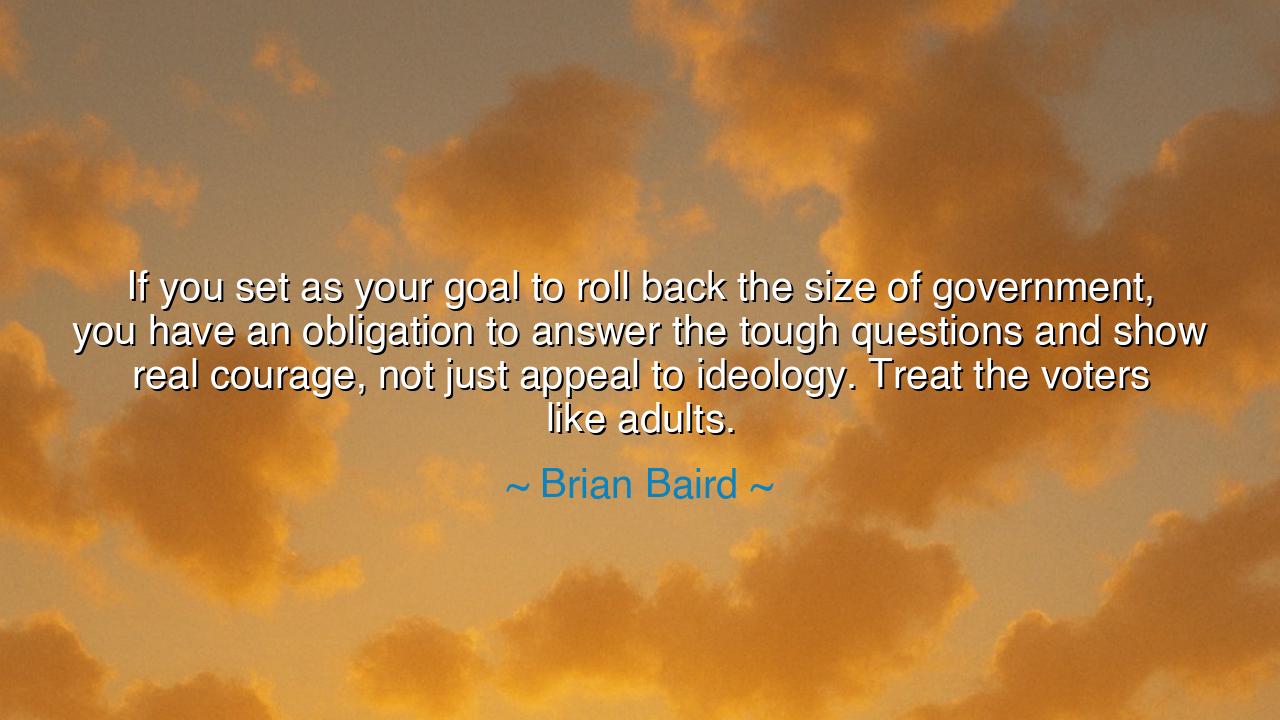
If you set as your goal to roll back the size of government, you
If you set as your goal to roll back the size of government, you have an obligation to answer the tough questions and show real courage, not just appeal to ideology. Treat the voters like adults.






The statesman Brian Baird, a man known for his measured mind and deep sense of civic duty, once declared: “If you set as your goal to roll back the size of government, you have an obligation to answer the tough questions and show real courage, not just appeal to ideology. Treat the voters like adults.” Though these words were spoken in the realm of politics, their wisdom reaches far beyond it. They remind us that true leadership—whether in government, in business, or in life—requires not merely belief, but honesty, responsibility, and the courage to confront complexity. For it is easy to speak in slogans, but it is sacred work to engage with truth.
Baird’s quote arises from his long experience in public service, where he saw how often ideology replaces integrity, and how the simplicity of rhetoric can seduce both leaders and citizens alike. To “roll back the size of government,” as he says, is not an evil ambition, nor a noble one—it is simply an idea, a vision. But to make such a goal meaningful, one must descend from the mountaintop of abstraction into the valley of hard choices, where numbers, needs, and human lives intersect. He warns against the temptation of those who promise change but shrink from the discipline of reason and the demands of truth. His call to “treat the voters like adults” is a cry against the infantile politics of manipulation—a plea for honesty in a world too often ruled by illusion.
The ancients knew this truth well. The philosopher Plato, in his Republic, warned that the downfall of democracy comes not from tyranny alone, but from flattery—when leaders tell the people only what they wish to hear, and citizens seek comfort rather than wisdom. In every age, there have been those who offer easy answers to difficult problems, cloaking themselves in noble ideals while avoiding the burdens of logic and responsibility. Baird’s words strike like a staff upon the ground, reminding us that courage is not shouting one’s convictions, but submitting those convictions to scrutiny. To lead is to face questions that have no simple answers, and still to act with clarity and compassion.
Consider, for example, the story of Abraham Lincoln during the American Civil War. He faced a divided nation and an ocean of suffering. Many urged him toward ideological extremes—some demanded immediate abolition at any cost, others clung to compromise. But Lincoln did not appeal merely to emotion or party; he wrestled with reality, questioned himself, and bore the heavy responsibility of balancing moral vision with practical survival. His courage was not the courage of pride, but of humility—the courage to think deeply, to listen, and to treat his people, as Baird would say, “like adults.” True leadership demands this kind of balance: the ability to hold ideals in one hand and reality in the other without letting either fall.
Baird’s warning is also a mirror to all who seek power in any form. For in every field—whether governance, religion, or art—there are those who would rather appeal to ideology than engage in truth. The ideologue speaks in absolutes; the wise speak in questions. The ideologue promises paradise; the wise acknowledge sacrifice. Baird’s courage is the courage of the second kind: the willingness to disappoint those who crave simplicity in order to serve those who deserve honesty. To “treat the voters like adults” means to trust them with the truth, even when it is uncomfortable. It is to speak not to their fears, but to their intelligence; not to their anger, but to their conscience.
In this, his words reflect a deeper moral law—that freedom without understanding is chaos, and that democracy itself depends on a mutual covenant between leader and citizen. The leader must respect the people enough to speak truthfully, and the people must respect the truth enough to listen. When this bond is broken, when politics becomes theater rather than service, nations lose their way. Thus, Baird’s quote is not merely about government—it is about the soul of responsibility itself, the sacred duty to match conviction with competence and belief with evidence.
So, my children of conscience, hear this teaching: ideals are the stars by which we navigate, but wisdom is the compass that keeps us from drifting into darkness. Do not seek leaders who dazzle you with promises; seek those who challenge you with truth. And when you yourself are called to lead—whether in family, in work, or in the affairs of a nation—remember that courage is not loudness, but clarity. Speak with honesty, think with humility, and trust that even in a world hungry for simplicity, the human spirit still honors truth. For as Brian Baird teaches, to treat others as adults is the highest form of respect—and to seek truth over ideology is the highest act of courage.






AAdministratorAdministrator
Welcome, honored guests. Please leave a comment, we will respond soon